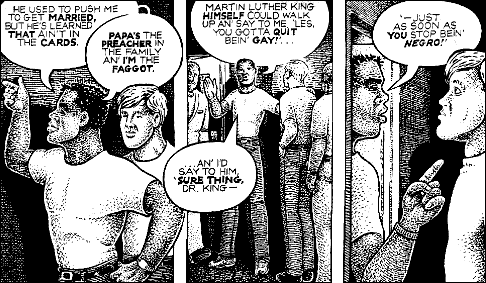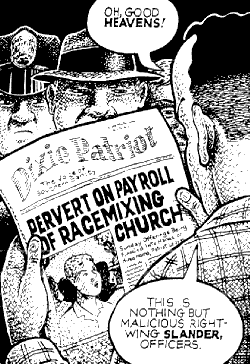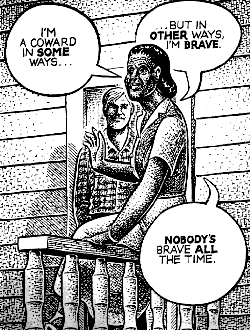Stuck Rubber Baby

 I’ve never been the sentimental type; I get bored at weddings and funerals, I tend to take both tragedies and celebrations in stride. But this book brought me to tears… and laughter. It’s that good.
I’ve never been the sentimental type; I get bored at weddings and funerals, I tend to take both tragedies and celebrations in stride. But this book brought me to tears… and laughter. It’s that good.
I don’t buy hardcover “graphic novels”, either. I think the term is pretentious, and I figure it’s silly to pay extra money for the snob appeal of a thick cardboard cover. But my appreciation for Cruse’s past work (the underground Barefootz, the wonderful “gays next door” comic strip Wendel, and editing the original Gay Comix) and the years of waiting since he last released anything, prompted me to shell out the $25 for this book, rather than waiting for a possible TPB. While I don’t regret taking that plunge, those with more patience have been rewarded with a softcover reprint at almost half off. DC is pricing it to sell.

Unlike most “graphic novels” (really just collections of several comic book issues pretending to be something greater), Stuck Rubber Baby lives up to the pretense. It tells a story far too complex (in both characterisation and plot) to be dismissed as “short story” (which is what most GNs really are). And the story is very well served by the graphic format; by showing (rather than telling) much of the story, Cruse gives it an immediacy that plain text cannot achieve, and the narrative captions give it a thoughtful intimacy that moving pictures rarely accomplish.
The book is divided into chapters, but it didn’t need to be. I certainly didn’t use them as “break” points. I read it cover to cover, putting it down only by biological necessity. (It took the better part of an afternoon… you won’t breeze through this in half an hour.) My boyfriend read it before I had a chance. He picked it up late one night, and didn’t go to bed until he’d finished, even though this meant saying up into the “wee hours”, way past his usual bed time. (He’s more literary than I, and less taken with comics. He said it was one of the best books he’d read in some time.)
The cover of Stuck Rubber Baby is a crowd of people. You can tell from the composition which one is Toland Polk, the protagonist of the story, but the rest are just a tossed salad of faces: a heavy bald black man, a young white woman in cat eye glasses, a handsome black young man, a middle-aged white priest, etc. But when I finally put the book down and looked at the cover again, I realised that I really knew each of these people! That’s Ginger! There are Melanie and Orly! That’s Mabel, and Effie… and Shiloh… and Toland’s parents… I found I could easily identify nearly every person… I mean “character”… as I worked my way toward the back of the (imaginary) scene. (On the book itself, the title covers the upper-left quarter of the picture. I was glad to finally see the whole thing in the solicitation in Previews.)
 Cruse’s art is somewhat paradoxical, especially in Stuck Rubber Baby. It has always been rather cartoony, with oversized jaws, disproportionate limbs, etc. That’s still true (though less so than in his “comic” work), but Cruse has developed a style which includes painstaking detail at the same time. One look at the carefully crosshatched shading on each page will make it clear why this book was nearly 5 years in the making. (And yet it looks nothing like the “hot” art which has given crosshatching such a bad name.) The only drawback of this is that, reduced for printing, it tends to get kind of dense and dark. In the acknowledgements at the end of the book, Cruse thanks various people for providing him with “period” reference material for cars, vacuum cleaners, gas pumps, etc. and it’s not surprising, because the visuals ring true, and are so carefully well done.
Cruse’s art is somewhat paradoxical, especially in Stuck Rubber Baby. It has always been rather cartoony, with oversized jaws, disproportionate limbs, etc. That’s still true (though less so than in his “comic” work), but Cruse has developed a style which includes painstaking detail at the same time. One look at the carefully crosshatched shading on each page will make it clear why this book was nearly 5 years in the making. (And yet it looks nothing like the “hot” art which has given crosshatching such a bad name.) The only drawback of this is that, reduced for printing, it tends to get kind of dense and dark. In the acknowledgements at the end of the book, Cruse thanks various people for providing him with “period” reference material for cars, vacuum cleaners, gas pumps, etc. and it’s not surprising, because the visuals ring true, and are so carefully well done.
I’m sure that some will dismiss Stuck Rubber Baby, unread, as a “propaganda” piece that’s just trying to convince people that it’s OK to be gay, or that homophobia and racism are equally bad. But if anything, Cruse’s message is more mixed and subtle. The issues are not the same, but are intertwined in complex ways. Cruse shows that through Toland Polk, a white Southerner who struggles to accept and understand himself while becoming aware of the evil of the racism that surrounds him.
Stuck Rubber Baby isn’t perfect, of course. The subject matter of the book (a gay man coming to grips with his sexuality) isn’t all that new anymore (at least not to those of us who’ve been reading gay lit over the past decade or two). But the way Cruse intertwines the story with the tale of a Southern town coming to grips with the civil rights movement makes it fresh and involving. Also, the last few pages kind of went over my head… but then, like I said before, sentimental imagery often doesn’t work for me.
Actually, my biggest complaint is that the book isn’t bigger. The pages are about an inch shorter than a standard comic book. I suspect it was originally intended to be printed in larger proportions, but was reduced somewhat to keep the paper costs down. It’s a shame, because the art would look better closer to full size. But if the alternative were an even higher price tag… well, I’d pay it, but I can understand why many people would be scared off.
 Now, If my review here and my recommendation don’t make you rush out to buy this book, perhaps the names of comics geniuses Stephen Bissette, Will Eisner, Scott McCloud, and Harvey Pekar (whose endorsements helped Cruse get the funds to finish this project) will mean more to you. Or (for those more familiar with gay literature) Tony Kushner, Harvey Fierstein, Martin Duberman, Armistead Maupin, and Randy Shilts. These people know what they’re talking about.
Now, If my review here and my recommendation don’t make you rush out to buy this book, perhaps the names of comics geniuses Stephen Bissette, Will Eisner, Scott McCloud, and Harvey Pekar (whose endorsements helped Cruse get the funds to finish this project) will mean more to you. Or (for those more familiar with gay literature) Tony Kushner, Harvey Fierstein, Martin Duberman, Armistead Maupin, and Randy Shilts. These people know what they’re talking about.
Years ago, before DC launched Vertigo and long before Paradox Press, DC gave the go-ahead for Stuck Rubber Baby. Everyone (include Cruse) was skeptical that “the House of Superman” had room for something this challenging and unique. I’m glad it did.
Tired of artificial X-angst? Disappointed by trendy Vertigo lesbians? Concerned that multi-culturalism in comics is being cancelled with half of the Milestone line? Pick up Stuck Rubber Baby. You won’t regret it.
P.S. Yes, “Stuck Rubber Baby” does mean something… it’s not just a clever bit of marketing babble or the name of the latest “alternative” band. No, I won’t explain it. {grin}
